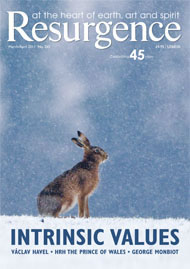In January 2009 I attended the opening of the Centre for Climate Change Economics and Policy at the University of Leeds, at which Nicholas Stern was a keynote speaker. Three months earlier The Daily Telegraph had announced the end of capitalism, yet the conference might as well have been held in the boom times. It was a thoroughly dispiriting taste of business as usual the ‘environmental’ way.
Former Harvard economist Juliet Schor’s first sentence in her book Plenitude is “Global capitalism shattered in 2008.” She goes on to describe the shocking scale of the problems we face. She calculates that the weight of material extracted to provide the average American with their daily shopping is 362lb (164kg) – that’s the equivalent of the weight of a racehorse every three days. She lists the false assumptions made by the standard economic model, squares up to global warming and pulls the rug from under the ‘ecological’ economic models that encourage further growth before we act to cut emissions.
You’d think this would be a depressing read, but its power lies precisely in its ability to be frank without getting you down. Schor’s agenda here is to get away from what she calls “trade-off thinking”, in which we weigh the pros of growth against the cons of environmental and social responsibility. Plenitude is a blueprint for a new economics of true wealth on a finite planet, a positive vision of a desirable future.
Schor offers four principles for plenitude, which she summarises as “work and spend less, create and connect more”. In turn they yield the ecological benefits of ‘emit and degrade less’ and the human ones of ‘enjoy and thrive more’.
It’s her third principle that is most provocative. She claims that the economic alternative to the false materialism of symbolic purchases and sickening waste is “true materialism”. The alternative to ‘we want more’ isn’t ‘we want less’ (because hardly anyone does) but ‘we want better’ – the consequence of which is requiring less. “True materialism” is a passion for quality over quantity, valuing skills, and demanding to know where things come from, where they go and who is affected along the way. It encourages long-lasting goods, repairing, sharing, reusing and recycling. This is the deliberate “creation of a rich, materially bountiful life”. That’s a message you can sell.
If there is a weakness, it is in Plenitude’s avoidance of any discussion of the vested power interests that entrench false materialism and resist change. Schor dodges this one by saying that plenitude is a strategy that we can start now. We don’t have to wait for government or Wall Street to get on board. We can be “pioneers of the micro activity that is necessary to create the macro equilibrium to correct an economy that is badly out of balance”.
Throughout the book, the author gives countless examples of ordinary everyday pioneers. Yet my feeling is that the powers behind ‘business as usual’ are loath to cooperate. She says, for example, that raising the price of oil to reflect its real costs is necessary, without actually tackling the political realities that make it so unlikely.
Plenitude will, I believe, be a vital part of a change that isn’t quite as easy as Schor implies.







